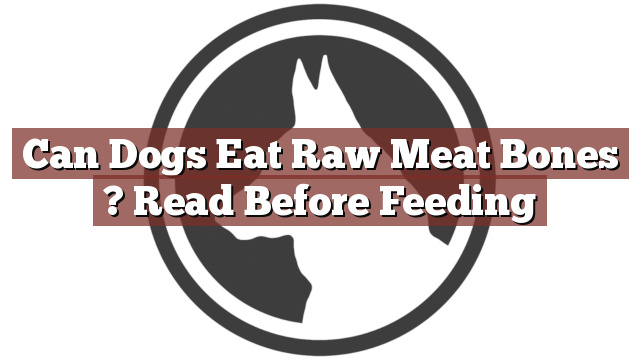Understanding Your Dog’s Dietary Needs
As a dog owner, it is important to understand the specific dietary needs of your furry friend. Dogs are omnivorous animals, meaning they can consume both meat and plant-based foods. However, their digestive systems are primarily designed for the digestion of meat. This is because dogs have a shorter digestive tract compared to humans, which allows them to break down and absorb nutrients from meat more efficiently.
While dogs can consume a variety of foods, it is crucial to provide them with a balanced and nutritious diet. This includes a combination of high-quality commercial dog food, supplemented with occasional treats and fresh fruits and vegetables. It is also important to consult with a veterinarian to ensure that your dog’s specific dietary needs are being met.
Can Dogs Eat Raw Meat Bones? Read Before Feeding
Can dogs eat raw meat bones? This is a common question among dog owners, and the answer is yes, dogs can eat raw meat bones. In fact, raw meat bones can provide several benefits to your dog’s overall health. Chewing on bones helps to clean their teeth, preventing the buildup of plaque and tartar. It also provides mental stimulation and can help alleviate boredom.
However, it is important to note that not all bones are safe for dogs to consume. Cooked bones, especially those from poultry, can splinter and cause serious injuries, such as choking or internal damage. It is crucial to only provide raw bones to your dog, as they are softer and less likely to break into sharp fragments. Always supervise your dog while they are chewing on bones to ensure their safety.
Pros and Cons of Feeding Raw Meat Bones to Your Dog
Feeding raw meat bones to your dog comes with its own set of pros and cons that should be considered. On the positive side, chewing on raw bones can promote good dental hygiene by scraping away plaque and tartar. It also provides a natural and enjoyable activity for your dog, keeping them entertained and mentally stimulated.
However, there are also potential risks associated with feeding raw meat bones. One of the main concerns is the possibility of bacterial contamination, such as Salmonella or E. coli, which can cause food poisoning in both dogs and humans. It is important to handle raw bones with care and maintain proper hygiene practices. Additionally, some dogs may have sensitivities or allergies to certain types of meat, so it is crucial to monitor their reactions after consuming bones.
Conclusion: Considerations Before Feeding Raw Meat Bones to Your Dog
In conclusion, dogs can eat raw meat bones, but it is essential to take some precautions before feeding them to your furry friend. Ensure that the bones are raw and never cooked, as cooked bones can be dangerous. Supervise your dog while they are chewing on bones to prevent any choking or injuries. Additionally, be aware of the potential risks of bacterial contamination and make sure to handle the bones safely.
It is always recommended to consult with a veterinarian before introducing any new food items into your dog’s diet. They can provide personalized advice based on your dog’s specific needs and help you make informed decisions regarding their nutrition. Remember, a balanced and nutritious diet is key to keeping your dog healthy and happy.
Thank you for taking the time to read through our exploration of [page_title]. As every dog lover knows, our furry friends have unique dietary needs and responses, often varying from one canine to another. This is why it's paramount to approach any changes in their diet with caution and knowledge.
Before introducing any new treats or making alterations to your dog's diet based on our insights, it's crucial to consult with a veterinarian about [page_title]. Their expertise ensures that the choices you make are well-suited to your particular pet's health and well-being.
Even seemingly harmless foods can sometimes lead to allergic reactions or digestive issues, which is why monitoring your dog after introducing any new food item is essential.
The content provided here on [page_title] is crafted with care, thorough research, and a genuine love for dogs. Nevertheless, it serves as a general guideline and should not be considered a substitute for professional veterinary advice.
Always prioritize the expert insights of your veterinarian, and remember that the health and happiness of your furry companion come first.
May your journey with your pet continue to be filled with joy, love, and safe culinary adventures. Happy reading, and even happier snacking for your canine friend!

